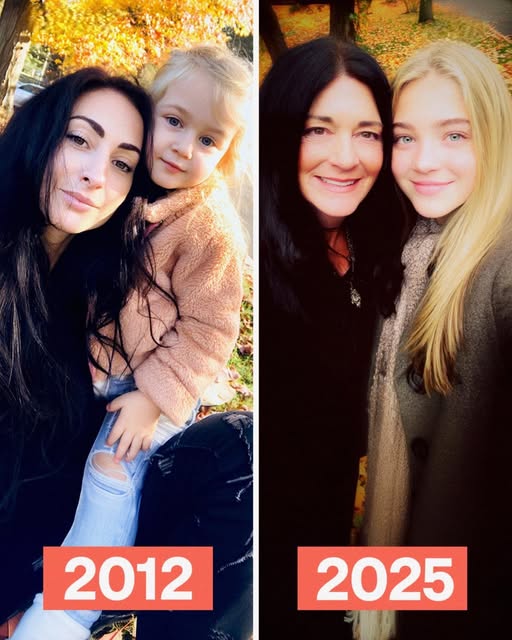For five years, the three of us built a life together. Lila worked long hours doing medical billing. I took extra shifts so Miranda always had what she needed. We celebrated birthdays with dollar-store decorations and cupcakes we baked at midnight. Miranda called me “Aunt Anna” and fell asleep on my shoulder during movies. Somehow, against every odd stacked against us, we were building the family we once only dreamed about.
Then, in one violent moment, it all fell apart.
Lila was driving to work when a delivery truck blew through a red light. The officer told me she died instantly, as if that tiny mercy would soften the impact. Miranda was five. She kept asking when her mommy would be home, and every time I explained, she cried until she couldn’t breathe.
Three days after the funeral, social services came to our apartment. A woman with a clipboard sat across from me at the kitchen table—and those tables never bring good news.
“There’s no immediate family willing to take Miranda,” she said. “If no guardian steps forward, she’ll enter the foster system.”
“No,” I said immediately.
“Are you related to her?”
“I’m her godmother.”
“That’s not a legal—”
“Then make it legal. I’ll adopt her.”
The social worker studied me the way people do when they’re trying to guess if you even understand what you’re volunteering for. But I knew exactly what I was saying. I’d lived the alternative. I wouldn’t let Miranda fall into it.
Six months later, after endless paperwork, inspections, interviews, and court dates, the judge signed the adoption papers. Miranda was officially mine. That night, I sat her on her bed and explained everything as gently as I could.
“I’m not your birth mom,” I told her. “But I’m your mom now. And that means I get to take care of you for the rest of my life—if you want that.”
She didn’t hesitate. “Forever?”
“Forever.”
Then she asked if she could call me “Mommy,” and I cried harder than I did in the courthouse.
The years that followed were messy, beautiful, exhausting, and absolutely worth everything. Miranda grew, mourned, learned, rebelled, and became her own person. We had nights where grief crawled back and swallowed her whole. We had mornings where I was so tired I put orange juice in her cereal and we laughed until we cried. I taught her how to drive. Held her through heartbreak. Cheered at every play she auditioned for—even when she froze on stage and ran off in tears.
By seventeen, she was taller, stronger, and surer of herself than I ever was at that age. She worked part-time at a bookstore, sang show tunes while doing dishes, and asked me real questions about life that I answered the best I could. She called me “Mom” without thinking. And every time, it landed in my heart like a gift.
When her eighteenth birthday rolled around, I threw her a party. Friends, neighbors, coworkers—everyone showed up. She laughed, blew out candles, posed for pictures. I went to bed that night thinking I’d done something right.
But later, while I was folding laundry, she stood in my doorway with an expression I couldn’t read. “Mom? Can we talk?”
I sat down, suddenly uneasy. She came in slowly, her hands in her pockets, eyes shiny with something I couldn’t name.
“I got access to the money,” she said. “Everything Mom—Lila—left me. The insurance payout. Her savings. All of it.”
I nodded. I’d set the account up myself. I’d saved every penny for her. “It’s yours to decide what to do with.”
She took a shaky breath. “You need to pack your things.”
For a moment, the world stopped. “You… want me to leave?” I whispered.
“No—God—no.” She pulled an envelope from her pocket. “Just read this.”
It was a handwritten letter. The kind you write when your heart is too full for speech. In it, she explained everything: for years, she’d watched me give up jobs, trips, relationships, and sleep just to make sure she never felt abandoned like I once had. She wrote that she wanted to give something back. Something big enough to matter.
With her inheritance, she had booked us a two-month trip through Mexico and Brazil—places I always said I’d visit “someday.” She’d planned every detail. Hotels. Flights. Tours. Even learned enough Spanish and Portuguese to get by.
“That’s why you need to pack your things,” her letter ended. “Not because I want you gone… but because I want you to finally live.”
When I looked up, she was filming my reaction with tears running down her cheeks. “Surprise,” she whispered.
I broke. Not from pain, but from the overwhelming realization that the little girl who clung to me at five had become a woman capable of choosing love just as fiercely as I once chose her.
We took that trip. We walked through markets, swam in hidden pools, tried food that made us cry from spice, danced until sunrise, and sat on beaches talking about the past, the future, and the strange, unpredictable way life builds families out of thin air.
One night, under a sky full of stars, she asked, “Do you think my mom would be happy?”
“Yes,” I said instantly. “I think she’d be proud of us both.”
And for the first time in my life, I believed that family isn’t defined by blood, or birth, or circumstance. It’s defined by choice. By sacrifice. By the simple, stubborn act of staying.
To anyone raising a child who didn’t come from you: love built freely is just as real as love inherited. Maybe even stronger.
And to the little girl who became my whole world—thank you for choosing me back.

